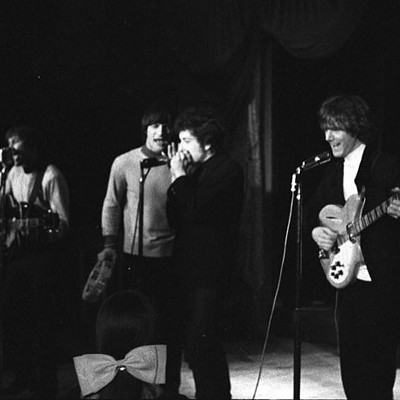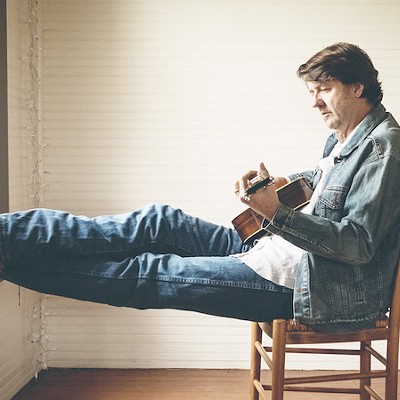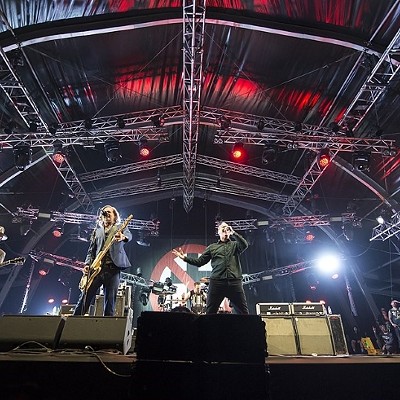On Halloween in the Year of Our Lord 2013, Krewella nearly destroyed the entirety of electronic-music history in less than four minutes during an episode of Good Morning America. “We’re gonna go hard!” yelled one of the Yousaf sisters. They fist-pumped. Lights stabbed away at good taste. They pressed a button or two, mid-jump. Nothing changed, but their energy made the captive studio audience believe that by jumping and pushing buttons, magic occurred. Sound poured into each one of their beings on the eve of All Souls Day. Their performance effaced the foundation that pioneers like Delia Derbyshire and Daphne Oram established, perpetuating the tired electronic-music stereotype that anyone can do it.
Flashback to 2011. The Renoise company — makers of the eponymous digital audio workstation used by electronic musicians, most notably Venetian Snares — composed a flattering feature on one of Houston’s native sons on the heels of his RaEP release, Daed (pronounced Ded). Daed, the moniker Ian Lambert conceived to construct his balanced and discordant array of sounds, decried the workstation’s power as a “sampling mangling tool.” Daed entered his song “Bears” in Renoise's Mutant Breaks 4 competition, and it became one of Renoise’s sample demo tracks, highlighted in the artist’s section of its website alongside FFF, Richard Devine and Bizzy B.
But Daed belongs in Renoise’s featured-artist section; with humility, he takes his place alongside glitch and breakcore’s finest, placing each dirnt, breet, gated snap and boom with the precision of a painter employing contrapposto on his canvas. “rectrec4” begins in the typical Daed style: drum patterns shifting at different measures played at, or near, 140bpm. All of a sudden, warm synth tones emerge that float freely over the arrested patterns. Airily, they contend with all the warmth found in a folk singer’s stripped-down setup.
“Separating the human from the machine is actually the opposite of what I am trying to do with my music,” muses Daed. “I believe that integrating machines into my music-making approach and expressing humanness through them is the overall goal of what I am doing.”
On “Bottoms,” from Daed’s mesmerizing new album, Fractional Dimension, he sends tender signals that breathe and bend, explode and rage with anger, and meditate and muse over frantic rhythms and moments where rhythms disappear. What casual listeners classify as noise becomes instruments of earnest expression. Standing in agreement with Squarepusher’s Tom Jenkinson, Daed furthers his connection between the tools he uses and the art he crafts with them.
“I don’t see what the intricacies of what machines are capable of as ‘cold’ or ‘inhibitive,’ rather, an enhancement of sorts," he says.
Who knew a onetime home-schooled, black-metal kid would find humanity in meticulously designed electronic rhythms? More than eight years ago, Daed put away his guitars when a friend introduced the DAW Renoise to him. His interest in creating digital labyrinths in the likeness of Autechre and Aphex Twin grew beyond the subtle web of his influences. Even though their vocabulary can be found in his compositional approach, his music possesses a personal nature that diminishes their impact.
“Aphex Twin and Autechre do both heavily influence my style,” offers Daed. “However, I try to avoid comparisons, as my music is something very personal to me. It is literally my emotions channeled directly into auditory form, like a journal. If I listen back to an old album, I’ll be taken back to exactly that point in my life and remember what was going on.”
Fractional Dimension sails unchartered waters for Daed, yet remains consistent with his literary analogy. Comparing his compositions to journal entries, it is impish, lighthearted at times, without sacrificing his flair for experimentation. The melodies of “Evrth” sound like little kids ditching school on a day too beautiful for them to remain in their seats. “Blind Shuffle” plays like a panic attack between tiny moments of levity.
His work is rife with allusions to mathematical and scientific figures and concepts. "Fresnel Acid," for example, is an ode to the father of the compact lens who helped to introduce the world to lighthouses. Daed’s love of science stems from a familial influence that today plays an important role in his art.
“Math and science have always played a large role in my life,” he says. "My father worked at the supercollider in Dallas before it got shut down, and I’ve always held a fascination with higher-level mathematical concepts, theoretical physics and chemistry. I find spatial dimensions (especially the ones beyond the third dimension), neural networks, artificial intelligence, fractals, black holes and the cosmos all to be extremely interesting. I often think about the seemingly fractal nature of existence, the infinite vastness of space and the fact that it seems everything is self-similar.”
Within the eight years of forging his own identity, Daed managed to generate a number of releases on three separate record labels and, with girlfriend Sarah Lachhman, helped to co-found badass Inner Loop electronic-music collective DEFUNKT. In late spring, he finished a European tour with Gareth Clarke, an artist on Canada’s Sublight Records (Venetian Snares, Bill Laswell), that brought him to England, Germany and France. Since he's recognized among fellow IDM and breakcore composers, and revered by those genres' most devoted enthusiasts, it raises the question: Why don’t more people in the States, even in the city he calls home, know of Daed's work and his accomplishments?
Like the Good Book says, “No prophet is accepted in his hometown," but his local anonymity does not dissuade Daed. He is still proud to call Houston home. “I choose to stay here in Houston for multiple reasons,” Daed recounts. “I have friends and family that are very dear to me, a beautiful girlfriend who inspires and motivates me (and who I helped found the DEFUNKT collective), and a job offering a lot of opportunity that I am not ready to leave.”
Daed vows to continue introducing his glitchcore sounds to new audiences in Houston and beyond. To hear him is to hear a deep appreciation of his nuanced craft. Unlike Krewella’s populist, fist-pumping, instant-gratification appeal, artists like Daed, Venetian Snares and Bill Laswell serve as reminders of how far electronic music has come and will continue to evolve if in the right hands. And authenticity is as much a part of Daed’s music as it is his personality — a trait all too rare these days.
See Daed's circuit-bending symphonies, alongside fellow Houston sonic architects Acid Jeep, Slactivist, P.L.X.T.X., Kona FM, Third World TV, Cyclea and Mundain Monstre, at DEFUNKT''s 1st Anniversary, 9 p.m. tonight at 4209 Washington. No cover.
Support Us
Houston's independent source of
local news and culture
account
- Welcome,
Insider - Login
- My Account
- My Newsletters
- Contribute
- Contact Us
- Sign out
[
{
"name": "Related Stories / Support Us Combo",
"component": "11591218",
"insertPoint": "4",
"requiredCountToDisplay": "4"
},{
"name": "Air - Billboard - Inline Content",
"component": "11591214",
"insertPoint": "2/3",
"requiredCountToDisplay": "7"
},{
"name": "R1 - Beta - Mobile Only",
"component": "12287027",
"insertPoint": "8",
"requiredCountToDisplay": "8"
},{
"name": "Air - MediumRectangle - Inline Content - Mobile Display Size 2",
"component": "11591215",
"insertPoint": "12",
"requiredCountToDisplay": "12"
},{
"name": "Air - MediumRectangle - Inline Content - Mobile Display Size 2",
"component": "11591215",
"insertPoint": "4th",
"startingPoint": "16",
"requiredCountToDisplay": "12"
}
,{
"name": "RevContent - In Article",
"component": "12527128",
"insertPoint": "3/5",
"requiredCountToDisplay": "5"
}
]
KEEP THE HOUSTON PRESS FREE...
Since we started the Houston Press, it has been defined as the free, independent voice of Houston, and we'd like to keep it that way. With local media under siege, it's more important than ever for us to rally support behind funding our local journalism. You can help by participating in our "I Support" program, allowing us to keep offering readers access to our incisive coverage of local news, food and culture with no paywalls.
Stephan Wyatt
Trending Music
- Country Rock Thrives with Gene Clark and Flying Burrito Brothers for Record Store Day
- Bruce Robison Is The Eternal Song Hunter
- Low Cut Connie Keeps One Foot In The Gutter
-
Sponsored Content From: [%sponsoredBy%]
[%title%]

Don't Miss Out
SIGN UP for the latest
Music
news, free stuff and more!
Become a member to support the independent voice of Houston
and help keep the future of the Houston Press FREE
Use of this website constitutes acceptance of our
terms of use,
our cookies policy, and our
privacy policy
The Houston Press may earn a portion of sales from products & services purchased through links on our site from our
affiliate partners.
©2024
Houston Press, LP. All rights reserved.




